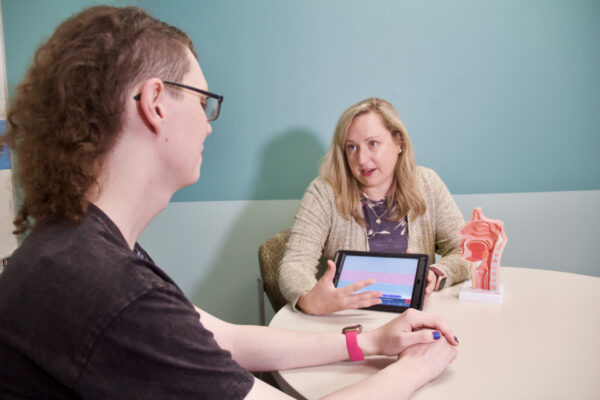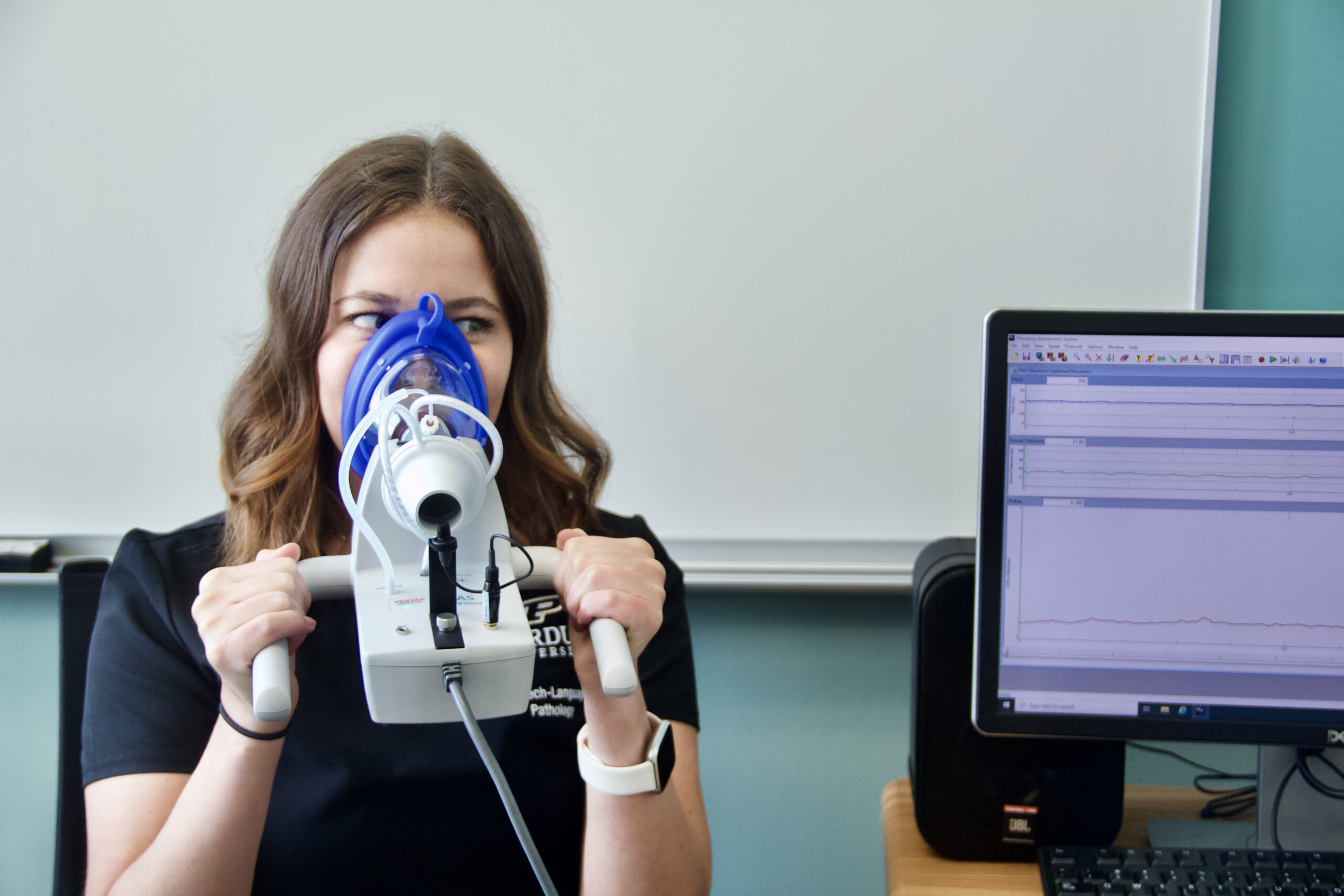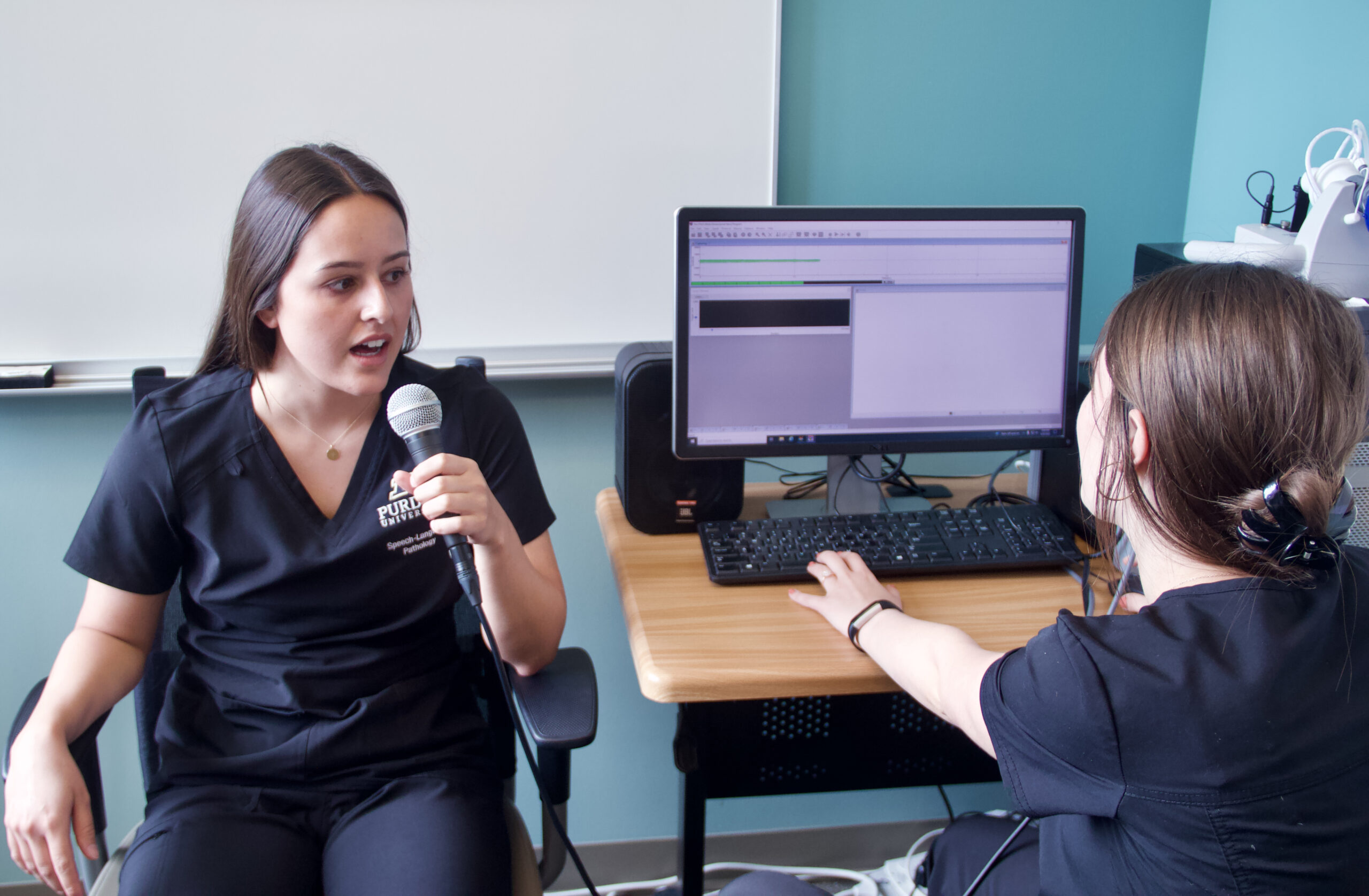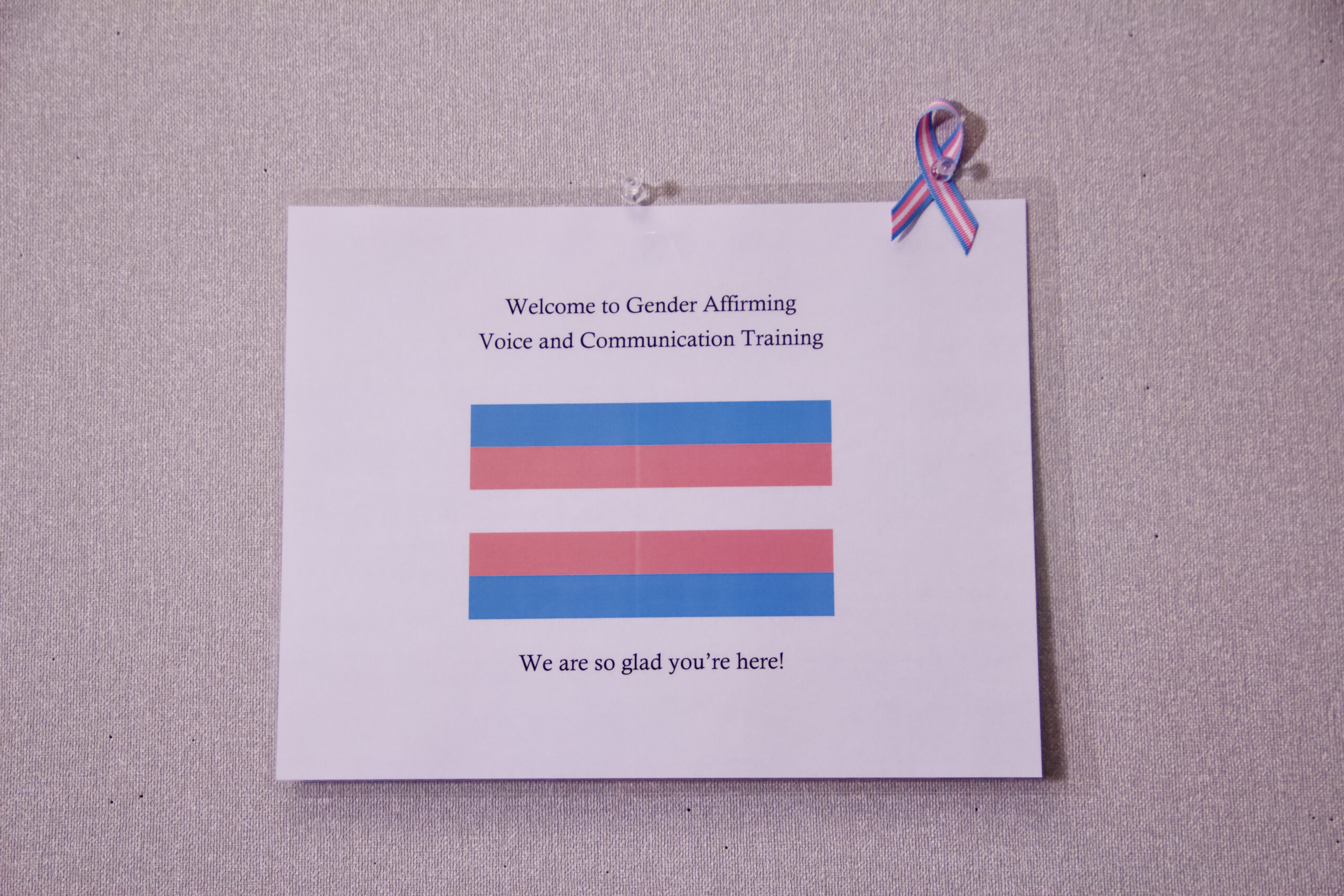Purdue Center helps trans community, Parkinson’s patients find their voice
Written by: Tim Brouk, tbrouk@purdue.edu
A little more than a year ago, Keita Wade’s life was very different. A transgender woman, she was still living closeted and not presenting female in early 2021.
After hearing about the Purdue University Center for Voice specializing in working with trans people, Wade participated in months of sessions with the goal of feminizing her voice through shortening and narrowing her vocal tract to create a brighter, more forward resonance. Led by Lydia Kruse, clinical assistant professor in the Purdue Department of Speech, Language, and Hearing Sciences, the exercises were intensive. Wade had to train her voice and brain to reach the right pitch, resonance, intonation and articulation. Wade’s sessions started in summer 2021 and continued in the fall.
Today, Wade is married to her husband, Riley, and is thriving, having graduated from Purdue in May with a degree in materials engineering. She already had multiple job interviews lined up.
“Doing voice (training) over last summer and getting to a place where I was comfortable using it was a big part of my last year at Purdue,” Wade said. “With the help of Lydia and getting my voice done, I have the confidence and ability to push myself to finally be authentic in representation.” The Purdue Center for Voice is part of the M.D. Steer Speech, Language, and Swallowing Clinics within the College of Health and Human Sciences. Professor Kruse said the center is open to adults of all gender identities, as will be monthly Zoom “meet-ups” where participants can continue their exercises from the comfort of their own homes while meeting new people in the trans community.

Clinical Assistant Professor Lydia Kruse, right, meets with Keita Wade, a participant in the Purdue Center for Voice’s Gender-Affirming Voice and Communication Training.Tim Brouk
“We accept any and all people,” she continued. “They don’t need to be trans. They can be nonbinary or however they identify; they are welcome to come.
“This is something that they would like to do to increase their satisfaction with their communication and experience more congruence with their gender identity. … It’s about exploring the voice, exploring the parameters of what makes the voice and finding what fits them the best.”
Kruse and her student assistants work in two programs: Gender-Affirming Voice and Communication Training and Parkinson’s disease vocal therapies. One side of Kruse’s speech-language pathology expertise coin gets a concentration per semester. They work one-on-one with patients and participants in the facility, which consists of two suites where intake and therapeutic sessions take place.
‘Annoying but exceedingly helpful’
The above words hang proudly on Kruse’s office wall like “home sweet home.” The quote was uttered by a Parkinson’s patient early in Kruse’s Purdue career in reference to the vocal exercises Parkinson’s patients must complete to combat hypophonia, a condition that gives the patient a soft vocal quality. These exercises are many and take effort to improve the preciseness and volume of speech.
“I know a lot of what I’m doing is annoying because I’m coaching and trying to get behavioral change,” Kruse laughed. “One of the students had that (sign) made for me, and it’s something I’ll cherish forever.
“It’s a lot of repetition. With Parkinson’s disease, there can be bowing of the vocal cords due to muscle atrophy. There’s also muscle rigidity and problems coordinating the respiratory movements that set the vocal cords into motion. Together, this can cause a very weak voice. It becomes very, very difficult for them to communicate with their loved ones, and they often don’t know they have a problem.”
The repetition of vocal exercises of “ahs” and pitch glides on the sound are meant to strengthen the muscles and recalibrate the patient’s amount of air flow through the vocal cords. Once clients build up some strength, they join other participants for group exercises. This not only pits their vocal quality against other Parkinson’s patients’, but it allows for a beneficial social component.
Barbara Kerkhoff was diagnosed with Parkinson’s disease in 2018. One of the symptoms that affected her daily life was the weakening of her voice. Recently retired from ministry work, the West Lafayette woman was still heavily involved in community organizations. The softer voice kept her quiet in most meetings. She deferred leadership roles, as no one could hear her words on first speech. The frustration bled into her personal life, affecting family relations and friendships.
“It became harder and harder to project, and oftentimes, people would ask me to repeat myself, which took even more energy,” revealed Kerkhoff, who attended regular sessions from January to April at the Purdue Center for Voice and is also a client for the Purdue I-EaT Swallowing Research Lab. “I’m married to someone with hearing loss, so our ability to communicate was becoming difficult on a pretty regular basis. That was beginning to increase the irritation relationally. It was important for me to understand what was happening with my voice and if there was anything I could do differently.”
While her voice is still weaker than before her Parkinson’s diagnosis, she has more confidence in speaking, and her family and friends can understand her easier.
“I still have to work at it; it’s just that I know what to do now,” Kerkhoff said. “Before, I was just frustrated. It’s removed the frustration and removed the irritation.”
Success is determined by measurements and sound quality they log with each session. Ideally, measurements will indicate louder, clearer sound levels than when the participants first walked into Lyles-Porter Hall.
“The clients had a lot of gains in their communication and also a lot of confidence built from the program,” Kruse said. “All of my clients have improved to different degrees.”
Technology of Voice

Halle Shoults, a graduate student in the Purdue Department of Speech, Language, and Hearing Sciences, tests out the Purdue Center for Voice’s phonatory aerodynamic system.Tim Brouk
Kruse and her students utilize some simple but effective equipment to measure voice levels from clients. Trans visitors to the facility will do their vocal exercises as an iPad records them. The app used by Kruse shows pink, gray and blue fields. A soundwave of the participant’s voice is recorded and measures the feminine (pink), androgenous (gray) and masculine (blue) pitches of the voice.
Participants also perform a constant “aahhh” into a microphone connected to a desktop computer’s acoustic software. The duration, volume, pitch and breath levels are captured in soundwaves and analyzed by Kruse and her team. A sound level meter, which looks like a handheld microphone with an LED screen and several buttons, measures for decibels during voice exercises.
“A completely normal conversation level is probably like 65 or 75 dBs,” said Kruse, who also runs a clinical practicum site at Lafayette Otolaryngology Associates. “A person with Parkinson’s might be at like 55 decibels, and they think they’re talking normally.”
Another device looks like it’s out of “Mad Max: Fury Road.” The participant holds the center’s phonatory aerodynamic system with two hands while pressing a blue rubber face mask snugly to their face. Again, the participant gives their best, strongest “aahhh.” This measures the aerodynamics of their breath flow as it relates to voice production.
Kruse said while the clinical treatments’ first goal is to help the participants, she plans to utilize the data collected the last two years for future research focusing on the Purdue Center for Voice’s patient outcomes.

Graduate student Savannah Limcaco, left, performs a vocal exercise into a microphone connected to a computer while fellow graduate student Mikahla Combs measures the output.Tim Brouk
Breakthroughs galore
Even if there are only a few people in the suite, participants must overcome embarrassment or shyness to do their “ahs” and “ohs” with volume and repetition. Wade and Kerkhoff both mentioned the tremendous coaching they received from Kruse and her students. The students are preparing for careers as speech-language pathologists. The experience they are receiving in the Purdue Center of Voice will pay dividends once their master’s degrees are earned. This involves encouraging a frustrated participant as well as rejoicing in victories.
“It was very fulfilling both for me and the client,” said Savannah Limcaco, one of Kruse’s graduate students. “It was a really fun process — learning how to be a better clinician while they learned how to produce a stronger voice.”
For participants like Wade and Kerkhoff, they are thrilled to have the Purdue Center for Voice available to them.
“A lot of trans women don’t even know that you could do this, that you can go from a male-presenting voice to a very passing feminine voice without the need for (vocal feminization) surgery,” Wade said. “There are a lot of trans women who feel they are stuck paying thousands of dollars to someone in an outpatient procedure that isn’t covered by insurance to get close to a good voice. Even then, the surgeries don’t give you the manipulability and results that voice training can.”

A welcome sign hangs on a wall in the Purdue Center for Voice.Tim Brouk
Discover more from News | College of Health and Human Sciences
Subscribe to get the latest posts sent to your email.